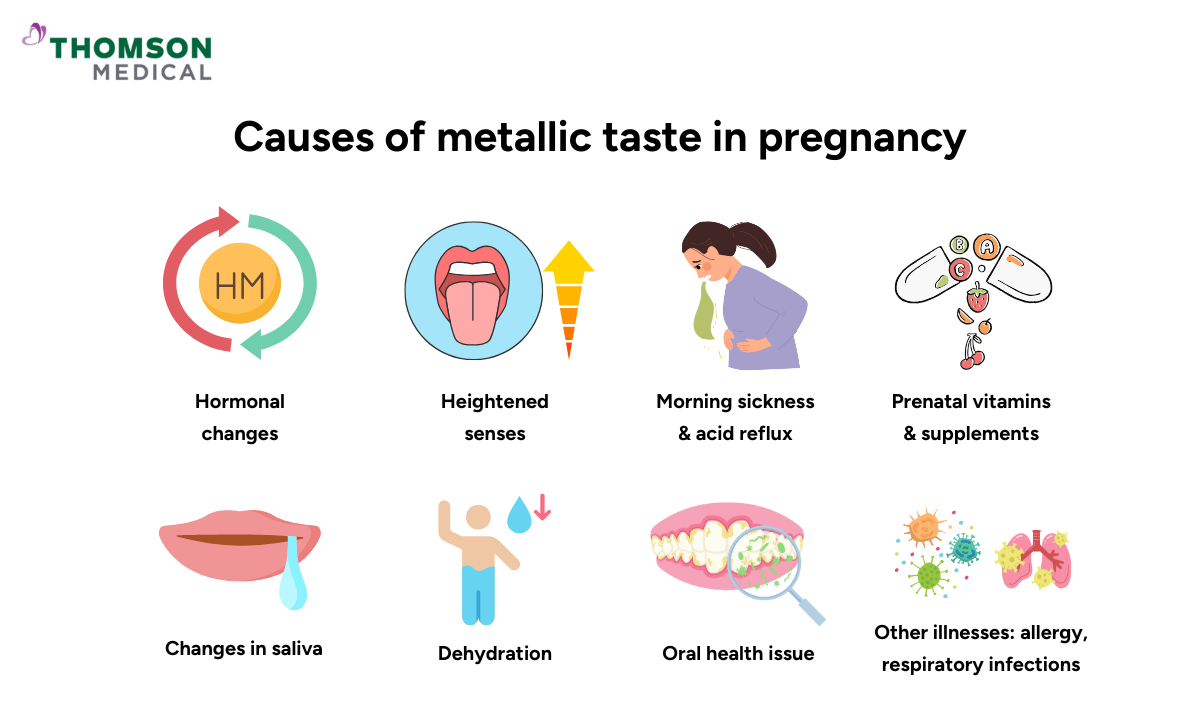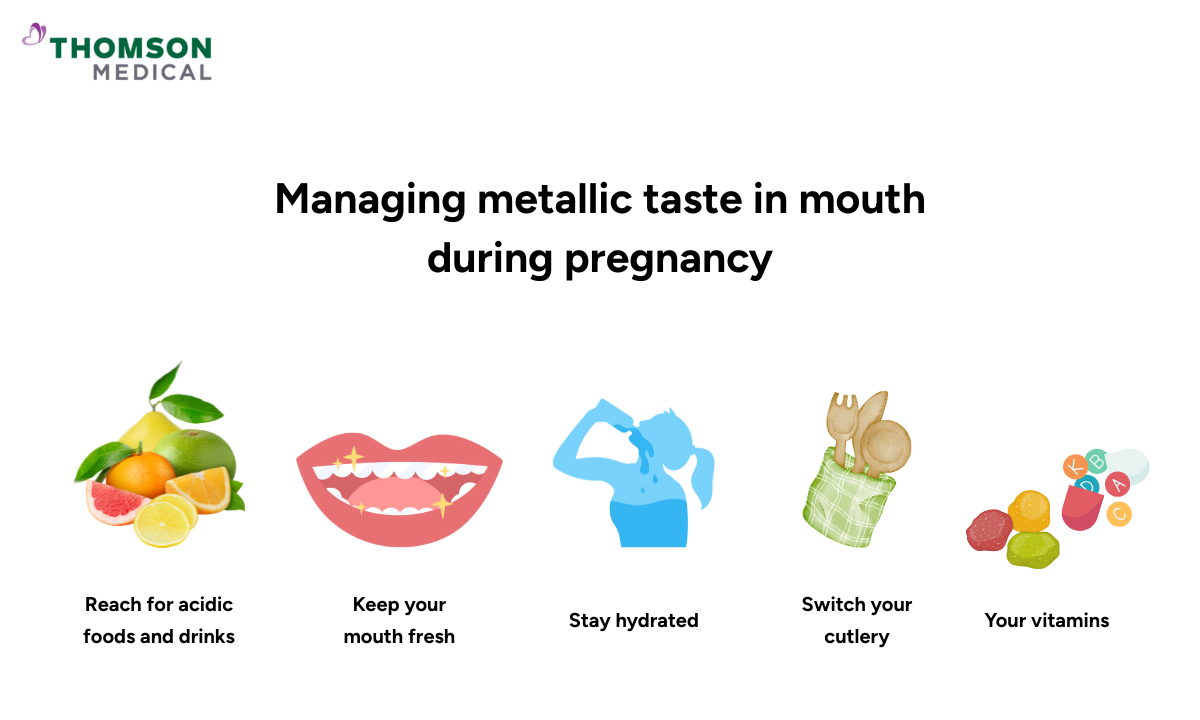Pregnancy is a journey filled with unfamiliar experiences, some of which may seem strange. One such experience is the odd metallic taste in your mouth that makes it feel as though you have been sucking on a coin. While this may be uncomfortable, it's actually a normal part of pregnancy, and there are remedies to ease the discomfort.
What causes a metallic taste in the mouth?
A metallic taste during pregnancy is a common but peculiar symptom known as dysgeusia or "metal mouth". This change in the way your taste buds work is usually associated with the surge of hormones that your body produces during pregnancy, particularly oestrogen, progesterone, and human chorionic gonadotropin (hCG).
While these hormones are vital for supporting your pregnancy, they can make your taste buds more sensitive. This alters how you perceive flavours and can increase saliva acidity, leaving you with a persistent metallic, sour, or even "penny-in-mouth" taste.
Other causes of metallic taste in pregnancy

While the pregnancy hormones are the common cause for that coiny taste, several other factors can contribute to or worsen the sensation. Here’s a more detailed look at what might be happening:
Hormonal changes:
During pregnancy, the surge in hormones, especially oestrogen, directly affects your taste buds. This can increase your sensitivity to certain flavours and lead to that distinct metallic or bitter taste.
Heightened senses:
Pregnancy can turn your sense of smell and taste into superpowers. This increased sensitivity can make everyday foods and smells seem much more intense, sometimes resulting in a metallic flavour.
Morning sickness and acid reflux:
Nausea, vomiting, and heartburn (also known as GERD or acid reflux) are very common during pregnancy. When stomach acid comes up into your mouth, it can leave behind a sour or metallic taste.
Prenatal vitamins and supplements:
The vitamins you take to support your baby are packed with minerals. Certain ones, especially those containing a high amount of iron, can leave a noticeable metallic aftertaste.
Changes in saliva:
You might notice you're producing more saliva than usual, or that its composition feels different. These changes in your saliva can directly affect how you perceive taste.
Dehydration:
Not drinking enough water can lead to a dry mouth and dehydration, which can concentrate the metallic taste and make it more obvious.
Oral health issues:
Pregnancy can make your gums more sensitive and prone to conditions like gingivitis (gum inflammation). Any oral health issues or gum infections can sometimes contribute to an unusual taste in the mouth.
Other illnesses:
Less commonly, things like allergies or respiratory infections (like a cold or sinus infection) can temporarily alter your sense of taste due to inflammation and congestion. In rare cases, underlying medical conditions can also be a factor, which is why it's always good to mention any persistent symptoms to your doctor.
When does the metallic taste start during pregnancy?
A metallic taste often shows up in early pregnancy, sometimes as soon as a week or two after conception. Because it can start so early, some women notice it before they’ve even missed a period or taken a pregnancy test. It’s most common in the first trimester, usually around weeks 4 to 6, though the timing and intensity can vary from person to person.
However, this symptom usually doesn’t stick around forever. For most expectant mothers, the metallic taste begins to fade towards the end of the first trimester and is often gone completely by the second trimester (usually around weeks 12 to 14).
As your hormones start to settle down a bit, your sense of taste should return to normal. While a small number of women might find it lingers longer, it almost always resolves after the baby is born.
If you’re experiencing persistent or uncomfortable symptoms, it’s best to speak with a healthcare professional. Request an appointment with Thomson Women’s Clinic to get support throughout your pregnancy journey.
Our O&G specialists
Loading...
How to manage the metallic taste?

While you may not be able to eliminate it completely, there are many simple and effective ways to manage and reduce the metallic taste:
Reach for acidic foods and drinks
Acidic flavours are brilliant at cutting through the metallic taste and stimulating saliva production, which helps wash it away.
Sip on citrus:
Try adding a slice of lemon or lime to your water. Citrus juices, such as sugar-free lemonade or orange juice, can also be very refreshing.
Enjoy citrus fruits:
Oranges, grapefruits, and pineapples can help cleanse your palate.
Try foods with vinegar:
Pickles, olives, and salads with a vinaigrette dressing might become your new best friends.
Keep your mouth fresh
Good oral hygiene can help to reduce the metallic taste.
Brush frequently:
Brush your teeth at least twice a day, and don’t forget to gently brush your tongue, where taste-altering bacteria can build up.
Rinse it out:
Swishing with a mild saltwater rinse (half a teaspoon of salt in a glass of warm water) or a baking soda rinse can help neutralise the pH in your mouth and get rid of the taste.
Chew some mints:
This stimulates saliva and masks the metallic flavour.
Stay hydrated
Drinking plenty of water throughout the day helps to rinse away the coiny taste and prevents dry mouth, a condition which can make the taste worse.
Switch your cutlery
This might sound strange, but if metal cutlery seems to enhance the metallic sensation, try switching to plastic, wooden, or bamboo utensils for a while.
Adjusting your vitamins
If you suspect your prenatal vitamins are the cause, don’t stop taking them. Here are some suggestions:
Take your vitamins with a meal to reduce the aftertaste.
Consider switching to a different brand with a lower iron content, opt for a coated tablet, or try a gummy version.
When to see a doctor
It's always best to mention any new or persistent symptoms to your doctor or gynae. You should definitely schedule a consultation if:
The metallic taste continues past the first trimester (beyond 12-14 weeks) or seems to be getting worse.
It's affecting your appetite to the point that you are losing weight or struggling to stay hydrated.
You believe it’s connected to other issues like your supplements, acid reflux, or a dental problem.
You experience other concerning symptoms alongside it, such as persistent nausea, difficulty swallowing, or you have general concerns about your nutrition.
Your doctor can provide reassurance, investigate the cause, and ensure you and your baby are healthy and well.
Early pregnancy support at Thomson Medical
At Thomson Women’s Clinic, our O&G specialists understand that symptoms like metallic taste, while normal, can be uncomfortable. We'll help you manage these symptoms whilst ensuring your pregnancy is progressing healthily.
Our services include
Pregnancy care and consultations:
Early pregnancy assessment with experienced O&G specialists
Assessment and management of early pregnancy symptoms (metallic taste, nausea, fatigue, food aversions)
Personalised advice for managing other uncomfortable symptoms
Regular monitoring throughout your first trimester
Nutritional support:
Dietary guidance for managing taste changes and food aversions
Advice on prenatal vitamins and supplements
Help with maintaining proper nutrition when appetite is affected
Support for managing nausea and digestive symptoms
For more information about metallic taste in the mouth during pregnancy and to discuss your individual circumstances, request an appointment with Thomson Women's Clinic.
FAQ
What week does a metallic taste start in pregnancy?
A metallic taste, often called dysgeusia, can begin as early as the first trimester, usually around weeks 4 to 6, when hormonal changes are most intense.
What are 5 warning signs of a possible problem during pregnancy?
You should seek medical help if you notice:
Heavy vaginal bleeding
Severe abdominal pain or cramping
Sudden swelling of face, hands, or feet
Severe headaches or vision changes
Reduced or no foetal movement in later pregnancy
How can I get rid of the metallic taste in my mouth while pregnant?
You can try:
Eating citrus fruits or sucking on sugar-free mints
Rinsing your mouth with salt water or baking soda solution
Staying hydrated
Brushing your teeth regularly, including the tongue
The taste usually fades as pregnancy progresses.
Should I be worried if I taste metal in my mouth?
A metallic taste is usually harmless and linked to hormonal changes. However, if it comes with other concerning symptoms like severe nausea, vomiting, or fever, consult your doctor.
What are the signs of an unhealthy baby in the womb?
Warning signs may include:
No or reduced foetal movement after 28 weeks
Abnormal heart rate on scans or monitoring
Poor growth seen on ultrasound
Low levels of amniotic fluid
Always speak with your doctor if you are worried about your baby’s wellbeing.
Does a metallic taste in your mouth mean twins?
No. Metallic taste is a common symptom in pregnancy and is not linked to carrying twins. It is mainly caused by hormonal changes, particularly increased oestrogen and progesterone.
The information provided is intended for general guidance only and should not be considered medical advice. For personalised recommendations and tailored advice, request an appointment with Thomson Women’s Clinic today.
For more information, contact us:
Thomson Specialists (Women's Health)
Thomson Women's Clinic (TWC)
- Novena:
6592 6686 (Call), 8611 8986 (WA) - Bukit Batok:
6569 0668 (Call), 8686 3525 (WA) - Choa Chu Kang:
6893 1227 (Call), 8282 1796 (WA) Jurong:
6262 8588 (Call), 6262 8588 (WA)- Katong (female doctor):
6970 2272 (Call), 8611 9020 (WA) - Punggol:
6243 6843 (Call), 8811 0328 (WA) - Sembawang: 6753 5228
- Sengkang: 6388 8125
- Serangoon (female doctor): 6382 3313
- Tampines: 6857 6266
- Tiong Bahru: 6276 1525
